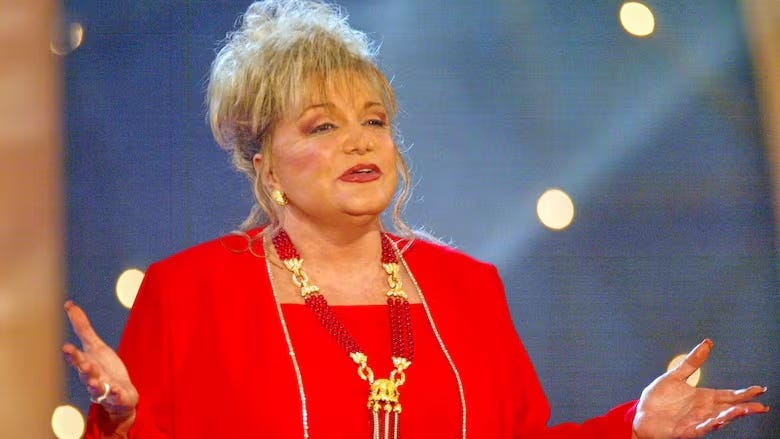Where The Boys Were, There Was Connie
Born December 12 1937, died July 17, 2025 (age 87 years)
A Voice That Refused to Fade
There are voices you remember, even when the songs slip away. Voices that don’t just sing the words but carry them, like secrets between heartbeats. Connie Francis had that voice.
It was clear, but never cold. Strong, but never stiff. And at its best, it sounded like it had been hurt once, but had made peace with the ache.
She died yesterday, aged 86, and the world feels a little quieter for it. But if you were ever lucky enough to hear Who's Sorry Now drifting from a record player, or Where the Boys Are echoing through a summer dance hall, then you know she never truly went away. She just became part of the soundtrack that plays beneath life’s quieter moments.
Built on Talent, Tempered by Turmoil
Born Concetta Rosa Maria Franconero in Newark, New Jersey, in 1937, she came from a family of Italian immigrants, rich in culture if not in coin. It was her father who saw the spark early. He coached her, pushed her, even renamed her. “Connie Francis” had a smoother ring for the American ear, and smoother was the way forward.
Her rise wasn't meteoric, not at first. She knocked on doors, sang in studios that forgot her name, and got knocked back by labels unsure where she fit. Too pop for the purists, too polished for the jazzmen, too Italian for the mainstream. But she had something they didn’t know how to measure yet. She had feeling. And when Who's Sorry Now hit the charts in 1958, they all felt it.
Suddenly, she was everywhere. Ed Sullivan. American Bandstand. Hollywood. Her voice was pressed onto every surface that could spin. In a world still finding its post-war groove, Connie offered comfort in the chaos.
Queen of the Heartache Hit
Before Dusty, before Diana, before Madonna ever dreamed of reinvention, there was Connie. And she didn’t need reinvention. She just needed a melody, a microphone and a story worth crying over.
She could make heartbreak sound like theatre. My Heart Has a Mind of Its Own. Everybody's Somebody's Fool. Breakin' in a Brand New Broken Heart. Songs that painted pictures of love gone sideways but never cheapened the pain. Her records didn’t demand sympathy, they offered solidarity.
She sang in Italian, Spanish, Yiddish, German. Not for novelty, but because she understood that a broken heart speaks every language.
And yet, for all her hits, for all the gold discs that lined the walls, Connie never truly shook the feeling that fame was a fragile friend. She knew what it was to be adored, but also what it meant to be abandoned by the industry that once kissed her name in lights.
Tragedy, Triumph, and the Will to Keep Singing
If life was fair, the story would end with a gentle fade out. But Connie’s life was not fair. Not remotely.
In 1974, she was the victim of a brutal assault in a hotel room in New York. It changed her. It shattered her emotionally and physically, leaving her unable to sing for years. She fell into silence. Lawsuits, hospitals, breakdowns. She vanished from public life, swallowed by grief and injustice.
But she did something extraordinary.
She came back.
Not just to sing, but to speak. She became a voice for victims, for mental health, for those whose stories were harder to hear. Connie didn’t hide the damage. She honoured it. She lived with bipolar disorder openly, long before that kind of courage became fashionable.
And though her voice lost some of its youthful sheen, it gained something else. Depth. Weight. Experience. When she sang later in life, it wasn’t about perfection. It was about honesty.
She kept performing into her later years, not because she needed the spotlight, but because she needed the connection. She said once, “The applause is the only thing that drowns out the noise in my head.”
There’s something painfully beautiful in that.
More Than a Name from the Past
To many, Connie Francis became a figure from another era, filed under nostalgia with poodle skirts and drive-in movies. But that’s lazy thinking. She was never a gimmick. She was never kitsch. She was the bridge between torch singers and pop stars, between operatic feeling and Top 40 accessibility.
She paved the road others danced down. Every tear-stained ballad from Whitney, every retro nod from Amy Winehouse, every break-up anthem from Adele owes something to Connie’s blueprint.
And more than that, she reminded us that vulnerability and strength are not opposites. They are twins.
She never pretended to be untouched by pain. She lived it, recorded it, and somehow still turned up to sing again.
A Goodbye in Her Own Key
Yesterday, as the news broke of her passing, the tributes will pour in. Many will mention her record sales, her awards, her hits. They’ll list the milestones. They’ll note her “firsts” as a female pop star.
But numbers never told her story well.
Her story is in the women who found courage through her voice. In the men who played her songs after goodbye letters. In the grandmothers who still hum Stupid Cupid when the kettle whistles. In the silence that follows Mama when played on Mother's Day.
Her voice will still fill rooms long after the headlines fade.
She did not outlive her era. She outshone it.
To Connie Francis, who sang like the sky had cracked open, and still made the pieces sound like music, rest well. You were never just a singer. You were a feeling. And you always will be.



